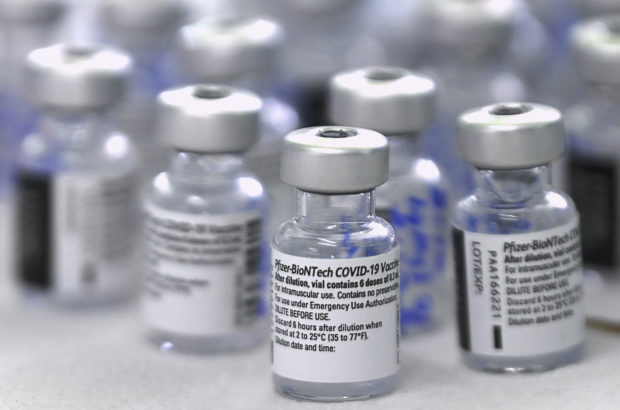The Pfizer/BioNTech vaccine bet that paid off

Picture of vials of the Pfizer-BioNTech vaccine against COVID-19 taken as elderly people are being inoculated amid the novel coronavirus pandemic, at the Belisario Porras school San Francisco neighborhood in Panama City on March 4, 2021. Photo by Luis ACOSTA / AFP
PARIS — With a strategic alliance, 24-hour production and a bit of luck, Pfizer and BioNTech were able to roll out their Covid vaccine at a brisk pace and relatively free of controversy.
US pharmaceutical giant Pfizer and BioNTech, a smaller German biotech firm, joined forces on April 9, 2020, as the world reeled from the pandemic, with deaths soaring and nations under lockdown.
The companies set an ambitious goal: Producing hundreds of millions of jabs in 2021 — an incredibly short timeline when vaccines usually take years to develop and secure regulatory approval.
Seven months later, Pfizer announced promising results from clinical tests showing the vaccine developed by BioNTech was 90-percent effective against the novel coronavirus.
The shot — using the hitherto unproven mRNA method to deliver vaccines — has since proven a success in public rollouts across the world.
Article continues after this advertisementIn March, BioNTech even promised 2.5 billion doses this year, a quarter more than initially planned.
Article continues after this advertisementThe vaccine currently plays a leading role in European vaccination campaigns and in the United States.
Exhausted employees
The shot’s success has helped overcome suspicions the companies were driven by the chance to make profits.
In November 2020, Pfizer CEO Albert Bourla raised some eyebrows when he raked in millions from selling company shares just after the announcement of the positive clinical test results, although the share sale was long planned.
Then in January, another controversy erupted when Pfizer announced that its vaccine vials contain six doses instead of five.
The company had a lot to gain with the change. With the stroke of a pen, it boosted its deliveries by 20 percent.
But in Europe, and to a lesser extent in the United States, health professionals worried they didn’t have enough special syringes to get the sixth dose out of the vial.
Two months later the controversy has been forgotten. French and US health authorities, when contacted by AFP, said they are not aware of any problems obtaining enough of the special syringes.
“That has never been a problem,” said Romain Comte, who runs a vaccination clinic in Paray-le-Monial in the centre of France. “Now that things have been cleared up, we even manage to get a seventh dose of the Pfizer vaccine” from the vials.
Pfizer has also escaped labour difficulties despite its staff coming under enormous pressure, such as in its facility in the Belgian town of Puurs.
“In the Covid departments, we work 24/7,” said Patrick Coppens, a representative of the FGTB union, adding that wages are low.
“Many of my colleagues are on the edge of nervous breakdowns as they’ve been doing this for a full year,” he said. “It can’t continue like this.”
Despite disagreement about wages in the sector, labour unions have called on workers at the Puurs plant not to go on strike given the pandemic.
Another sensitive subject is the vaccine’s price.
According to documents accidentally disclosed by a Belgian official, the EU is paying 12 euros ($14) for each Pfizer/BioNTech vaccine dose.
While cheaper than what Moderna charges for its vaccine, it costs 10 euros more than the AstraZeneca/Oxford University jab.
Cold storage
Pfizer/BioNTech and Moderna used the innovative messenger RNA (mRNA) technique for their vaccines.
The downside is that the doses must be kept at ultralow temperatures, though Pfizer has managed to demonstrate that its vaccine can be kept up to two weeks at less intense cold.
“Pfizer and Moderna are very aware at the moment they can only use their vaccines in developed countries because the storage and distribution are going to be quite difficult,” said Adam Barker, a health industry expert at London-based asset manager Shore Capital.
With hundreds of millions of doses in production at the Serum Institute of India, the world’s largest manufacturer of vaccines, AstraZeneca could eventually overtake Pfizer.
It is stored at a warmer temperature and billed as the vaccine of choice for poorer countries since it can be transported more readily than some counterparts.
“AstraZeneca of course know their vaccine will be used much more widely in the developing world,” due to its price and easier handling, Barker said.
But AstraZeneca’s jab has faced some setbacks as several countries have halted its use among younger people over concerns about rare cases of blood clots in some recipients.
The British company has also been reprimanded by the European Union over delays in delivering tens of millions of doses.
Pfizer also had some delays earlier this year, notably in Puurs, which the company said was due to efforts to step up the speed of production.
Pfizer has since made up for the delays.
Other rivals have fared worse.
French pharmaceutical giant Sanofi is months behind in its main vaccine development, while US firm Merck dropped its vaccine candidate.
By joining forces with a larger company like Pfizer, BioNTech was able to produce many more doses than Moderna, which relies on subcontractors.
But the biggest bet was using the mRNA technique. Already used for animal vaccines, it had promising potential but no guarantee it would work.
“If we had this conversation a year ago, I would have been advising caution,” said Dan Mahony, health specialist at British fund Polar Capital.
“It worked a lot better than I would have thought.”
For more news about the novel coronavirus click here.
What you need to know about Coronavirus.
For more information on COVID-19, call the DOH Hotline: (02) 86517800 local 1149/1150.
The Inquirer Foundation supports our healthcare frontliners and is still accepting cash donations to be deposited at Banco de Oro (BDO) current account #007960018860 or donate through PayMaya using this link.